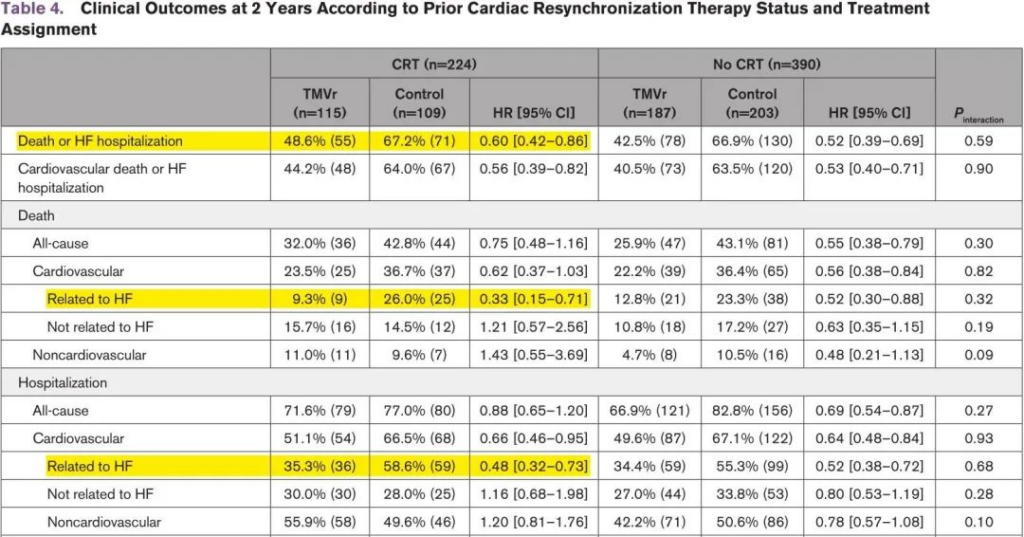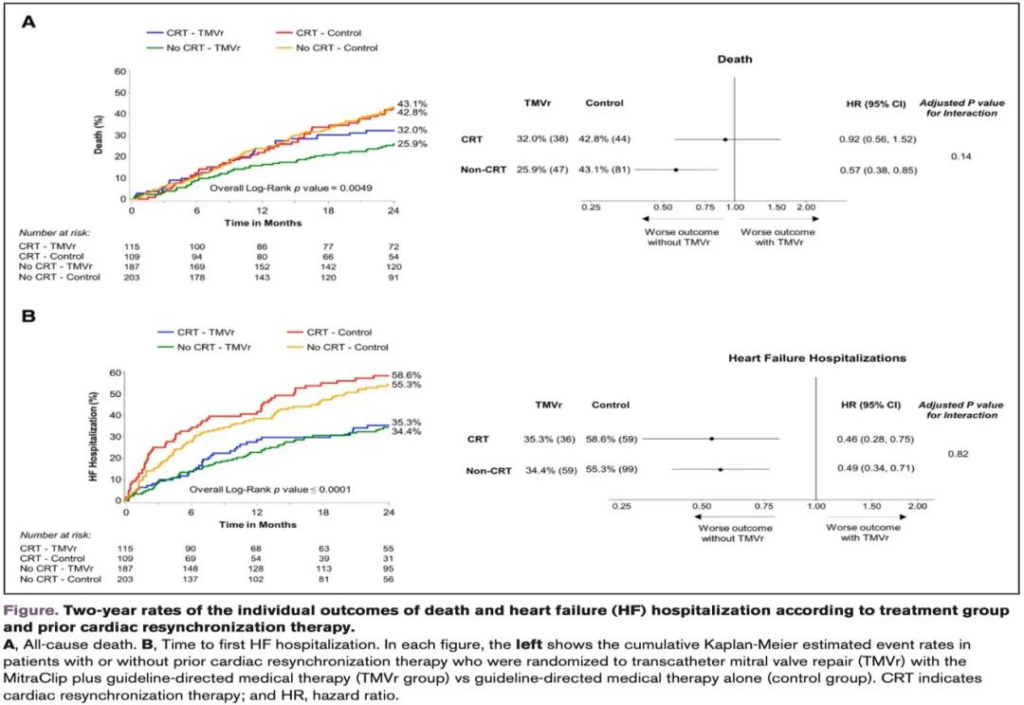CRT: Transcatheter mitral valve repair
- Normal Liver Cells Found to Promote Cancer Metastasis to the Liver
- Nearly 80% Complete Remission: Breakthrough in ADC Anti-Tumor Treatment
- Vaccination Against Common Diseases May Prevent Dementia!
- New Alzheimer’s Disease (AD) Diagnosis and Staging Criteria
- Breakthrough in Alzheimer’s Disease: New Nasal Spray Halts Cognitive Decline by Targeting Toxic Protein
- Can the Tap Water at the Paris Olympics be Drunk Directly?
CRT: Transcatheter mitral valve repair
CRT: Transcatheter mitral valve repair. Transcatheter mitral valve repair is a prognostic study of patients undergoing cardiac resynchronization therapy.

In the COAPT randomized controlled study, the use of MitraClip to perform transcatheter mitral valve repair (TMVr) for patients with moderate to severe secondary mitral regurgitation (secondary mitral regurgitation, SMR) heart failure The benefits have been confirmed. However, the impact of MitraClip on the clinical prognosis of patients who have previously undergone Cardiac Resynchronization Therapy (CRT) is still unclear. A recent study published in Circulation: Heart Failure answers these questions.
Research overview
Research Background
The long-term prognosis of patients with secondary mitral regurgitation (SMR) combined with left heart dysfunction is not optimistic. Among these patients with heart failure and moderate to severe SMR, about 1/3 have undergone cardiac resynchronization therapy, that is, CRT pacemaker implantation. However, despite receiving CRT therapy, there are still 30%-40% of patients The prognosis is poor.
Some observational studies have found that for some patients who do not respond well to CRT treatment, transcatheter mitral valve repair (TMVr) is feasible and can significantly improve heart function and left ventricular volume. However, TMVr is effective against previous CRT pacemaker implantation. The long-term clinical prognosis of the admitted patient is not yet clear.
The COAPT randomized controlled study showed that in the patients with heart failure combined with moderate to severe SMR, the two-year mortality rate and hospitalization rate due to heart failure were significantly lower in patients treated with MitraClip and combined with guideline-directed medical therapy (GDMT) For the control group treated with drugs only.
Study population
A total of 614 patients with moderate to severe secondary mitral regurgitation were enrolled in the COAPT study. These patients still have symptoms of heart failure after medical treatment guided by standard guidelines. They were randomly divided into a drug treatment + MitraClip group (TMVr group) and a single drug treatment group (control group) by 1:1. The two groups of patients were regrouped according to whether they had received CRT treatment in the past, and the clinical prognosis of each group was analyzed and compared.
Research purposes
To evaluate the clinical benefit rate of MitraClip for patients with heart failure and moderate to severe secondary mitral regurgitation who have undergone CRT resynchronization therapy.
Study endpoint
The primary endpoints were all-cause mortality and hospitalization rate for heart failure within 2 years. Secondary endpoints include quality of life assessments, including Kansas City Cardiomyopathy Questionnaire (KCCQ) and six-minute walk test.
Research result
Among the 614 patients enrolled, 224 (36.5%) had undergone CRT (115 cases were randomly assigned to the TMVr group and 109 cases were assigned to the control group), and 390 (63.5%) did not undergo CRT (187 cases were randomly assigned To the TMVr group, 203 cases were divided into the control group). Among the patients who had undergone CRT, the mortality rate and hospitalization rate due to heart failure in the TMVr group were lower than those in the control group (48.6% vs 67.2%, the hazard ratio was 0.60 [95%] CI, 0.42–0.86]). Similarly, among CRT patients, heart failure-related deaths and heart failure hospitalizations within 2 years in the TMVr group were much lower than those in the control group.


Conclusion
In the COAPT study, for patients with moderate or severe secondary mitral regurgitation who had undergone CRT, MitraClip treatment with TMVr significantly reduced the mortality rate within 2 years and the hospitalization rate due to heart failure. Among them, heart failure-related deaths, Hospitalization for heart failure is more obvious. Of course, this study is a subgroup analysis of the COAPT study, and its statistical testing power is limited. In the later stage, it is necessary to design a randomized controlled study specifically for patients with moderate to severe secondary mitral regurgitation who have undergone CRT.
References
Kosmidou, I., et al. (2020). “Transcatheter Mitral Valve Repair in Patients With and Without Cardiac Resynchronization Therapy: The COAPT Trial.” Circ Heart Fail 13(11): e007293.
(source:internet, reference only)
Disclaimer of medicaltrend.org



